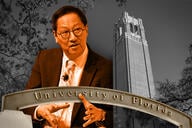You have /5 articles left.
Sign up for a free account or log in.
After months of wooing and under close scrutiny, edX was rejected this week by Amherst College amid faculty concerns about the online course provider's business plans and impact on student learning.
Amherst professors voted on Tuesday not to work with edX, a nonprofit venture started by Harvard University and the Massachusetts Institute of Technology to provide massive open online courses, or MOOCs. In interviews, professors cited a wide range of reasons for rejecting edX -- which currently works with only 12 elite partner colleges and universities -- starting with edX's incompatibility with Amherst’s mission and ending with, to some, the destruction of higher education as we know it.
Amherst – an elite liberal arts college where seminars are the norm and professors pride themselves on spending an hour on each student’s paper – has been looking for companies with which it could experiment with online education.
After rejecting for-profit companies, including 2U, Amherst decided to explore a deal with edX.
Amherst President Carolyn (Biddy) Martin left the final decision about the deal in the hands of her faculty. She expressed public support for working with edX but said she saw risks either way.
After months of deliberation on campus, the faculty met Tuesday night to decide if Amherst should join edX. The administration said it would respect the faculty vote. The faculty voted on a substitute motion offered by an opponent of the edX deal that concluded Amherst should chart its own course rather than join edX. Seventy faculty members then voted to formally approve that motion, 41 voted against and five abstained.
“It’s not something they reject totally,” Martin said in a telephone interview, referring to the faculty's online ambitions. “They just don’t want to do it right now through a firm that may or may not end up allowing us to do what our core values suggest we do in the form of teaching and learning.”
Some faculty wanted to expand Amherst’s repertoire and experiment online. Even professors who opposed a deal with edX say the college should look at doing more online. But the majority of faculty came to doubt edX on a number of fronts.
In a statement, edX said it was disappointed its courtship had ended the way it did. “We are disappointed that Amherst College will not be joining edX,” the venture said in a statement released by a spokesman. “Over the past several months we have had many productive meetings and wide-ranging discussions with Amherst’s administration and faculty. Amherst is a wonderful institution and we would have been delighted to have them join. We acknowledge that online educational platforms are not the appropriate solution for all courses or all faculty.”
Some Amherst faculty concerns about edX were specific to Amherst. For instance, faculty asked, are MOOCs, which enroll tens of thousands of students, compatible with Amherst’s mission to provide education in a "purposefully small residential community" and "through close colloquy?”
They also expressed broader concerns about the direction in which edX and others like it are taking higher education.
For instance, edX wants to offer its users completion certificates bearing Amherst's name. This worried some faculty, as well as Martin.
EdX also tried to sell Amherst by dispatching representatives to the campus over the course of several months. Those trips did not assuage concerns and, at some points, may have inflamed them, according to faculty members.
Adam Sitze, an assistant professor of law, jurisprudence and social thought, opposed efforts to join edX. He said faculty members raised questions that edX “didn’t and in some cases couldn’t” respond to.
“Relative to the internal study of MOOCs that we did, edX was not persuasive,” Sitze said.
There was an actual internal study by a nine-member committee of faculty and administrators. The 16-page report lays out the pros and cons of making a deal with edX. (The administration provided the whole document to Inside Higher Ed but asked that it not be shared.)
The report talks at length about how faculty members could use edX to experiment with online content and how difficult it might be for Amherst to try to replicate edX’s expertise. The document stresses that Amherst was being invited to pay to join edX for some costs -- $2 million for five years, perhaps. Amherst officials asked themselves if they could chart their own course with a similar amount of money and found the risk of failure may be greater if Amherst was on its own.
But officials worried that Amherst could still end up on the losing end of a deal with edX.
"Would Amherst get as much from the collaboration as edX would get from Amherst?" the report said in one of the "cons" sections. "EdX claims to want to revolutionize all of higher education, on campus as well as off. Are we experimenting with them, or are they experimenting with us?"
Tekla Harms, a geology professor who wanted to partner with edX, said the college should have at least tried to see if Amherst's small traditional classes could benefit from MOOCs and if MOOCs can be improved by Amherst's current teaching methods.
“The question is, can you build a bridge between the two?” she said. “And I think we should have tried to see if we could.”
EdX has 12 partner institutions, including Harvard and MIT. Among the members, only Wellesley College is a small liberal arts institution like Amherst.
David Cox, a math professor who favored having Amherst offer courses on edX, said he wanted to give small liberal arts colleges more say in the direction of online learning. “That’s one reason I wanted us to join: I think they actually need to talk to the people at liberal arts colleges,” he said. “I think they could have learned something from us having us there at the policy making part of it. So I’m a little sad because of that.”
Sitze, though, compared edX and MOOCs to a litany of failed dotcoms, including other education ventures with similar ambitions. He said MOOCs may very well be today’s MySpace – a decent-looking idea doomed to fail.
“What makes us think, educationally, that MOOCs are the form of online learning that we should be experimenting with? On what basis? On what grounds?,” Sitze said. “2012 was the year of the MOOCs. 2013 will be the year of buyer’s regret.”
Concerns About the Brand
In the end, the feeling that Amherst was experimenting with its own brand seemed to doom the partnership, said faculty on both sides of the debate.
Cox said certificates became a sticking point because it wasn’t clear what they would be used for. “For some people it’s a piece of paper; for some people, they will claim they have the equivalent of a college education because they have 48 certificates,” he said.
Several faculty worried Amherst would lose control of the meaning of the certificates, particularly in light of an effort in California that would force the state's public colleges to grant credit to students who finish unaccredited courses that are approved by a new panel.
Martin also said “it wasn’t very clear that certificates would be required” when Amherst began its talks with edX.
An edX spokesman said “one of the integral elements of the edX learner experience is the opportunity to earn a certificate of mastery. Institutions are given the option of offering designated ‘beta’ courses that do not include the opportunity to earn certificates of mastery.”
Faculty also worried about edX and its broader effect on higher education, particularly edX's plans to grade some student writing using only computer programs.
“They came in and they said, ‘Here’s a machine grader that can grade just as perceptively as you, but by the way, even though it can replace your labor, it’s not going to take your job,’ ” Sitze said. “I found that funny and I think other people may have realized at that point that there was not a good fit.”
In its internal report, the nine-member MOOC committee also worried that "the MOOC format will perpetuate the 'information dispensing' model of teaching (e.g., lectures, followed by exams).”
At Amherst, courses are taught in seminars and students are never given a multiple-choice exam. In MOOCs, most exams are multiple-choice and written work is graded by peers rather than professors – at least until MOOC providers begin to roll out software to grade student writing.
Some Amherst faculty members worried about their peers at less elite institutions.
The internal report expressed concern that MOOCs will "take student tuition dollars away from so-called middle-tier and lower-tier institutions," "enable the centralization of American higher education," "intensify the tiered structure of American higher education" and "may exacerbate the star [faculty] system."
The chair of the neuroscience program, Stephen A. George, led the opposition to joining edX. He said edX representatives “proudly said they turned down 300 institutions that wanted to join them.” That caused him to believe the purposes of partnership served edX’s interests, not Amherst’s or students’. He compared edX to industrial agriculture.
“Would we join some sort of agribusiness company that was taking over family farms and producing junk food if they offered us some incentive to do it?” George said.




